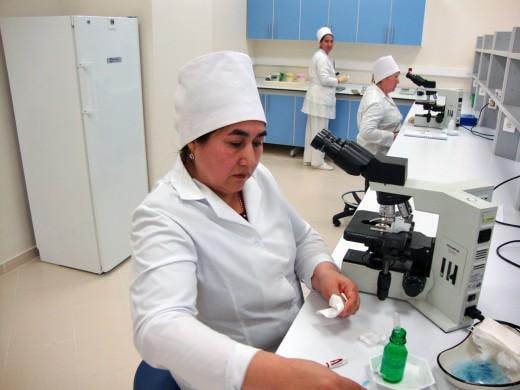
Tuberculosis (TB) is a leading infectious disease killer around the world and reversing the spread of TB is a top health priority for the United Nations.
We’ve made progress against the disease: Between 1990-2013, the TB death rate declined by 45%. Yet we still have a long way to go, especially as we grapple with TB that is resistant to the drugs that have long been used to treat it.
Last week, Ambassador Eric Goosby, the UN Special Envoy on Tuberculosis, briefed journalists at the United Nations Foundation office in Washington, D.C. on where we are in the fight against TB.
Goosby, who previously worked as the U.S. Global AIDS coordinator, highlighted the connection between TB and HIV/AIDS, saying that they “fuel each other’s fire.”
While HIV/AIDS is one of the world’s leading causes of death, TB is close behind, killing 1.5 million people in 2013, which averages to about 4,100 a day. In sub-Saharan Africa, TB, which is curable, kills about 1,000 HIV/AIDS patients every day. According to the World Health Organization (WHO), “TB is a leading killer of HIV-positive people causing one-fourth of all HIV-related deaths.”
Goosby discussed efforts to fight both diseases, while also calling for further action. He highlighted the importance of strengthening health systems in countries, as well as the work of the United States’ President’s Emergency Plan for AIDS Relief (PEPFAR), which he headed for number of years. PEPFAR has gone into developing countries to help build infrastructure to get medical supplies and health care to those who need it.
He explained, “If PEPFAR had not gone into these resource-poor settings and countries and built systems from the ground up, we wouldn’t have treated as many people as we have. We wouldn’t have been able to because the pills themselves do not find their way to infected individuals and get in their mouth without a medical delivery system that can orchestrate that.”
Goosby said that the efforts against TB should be led by health ministries in countries that are directly affected and reinforced through international and donor efforts. Health ministries, he said, must create and maintain strong health systems that engage the public and should encourage people to get tested, increase their resources, and establish regulatory measures.
Goosby explained that currently, countries with severe TB problems are actually funding 85% of the cost of care to fight TB. This allows countries to take ownership and work toward the UN’s goal to deal with major diseases and focus on universal health coverage.
These improvements are important, but emerging challenges threaten our progress against TB.
The rise of mycobacterial drug resistant TB (MDR TB) has complicated the treatment process. MDR TB is the result of TB bacteria not responding to the main anti-TB drugs. This phenomenon is the result of improper treatment of TB over many years, such as taking incorrect dosages or receiving low quality medicines. MDR TB requires the use of a second line of drugs and is significantly costlier to treat.
However, pharmaceutical companies have worked to develop two new drugs that fight MDR TB and have already been given FDA-approval. Manufacturers have engaged in a dialogue with WHO, the UN, and the Gates Foundation to ensure they are understanding what their drugs need to help accomplish.
During the briefing, Goosby said that people have become complacent and he hopes to get people to understand the severity of the issue and reinvigorate the efforts to fight TB.
(Photo: UNDP)



 View All Blog Posts
View All Blog Posts